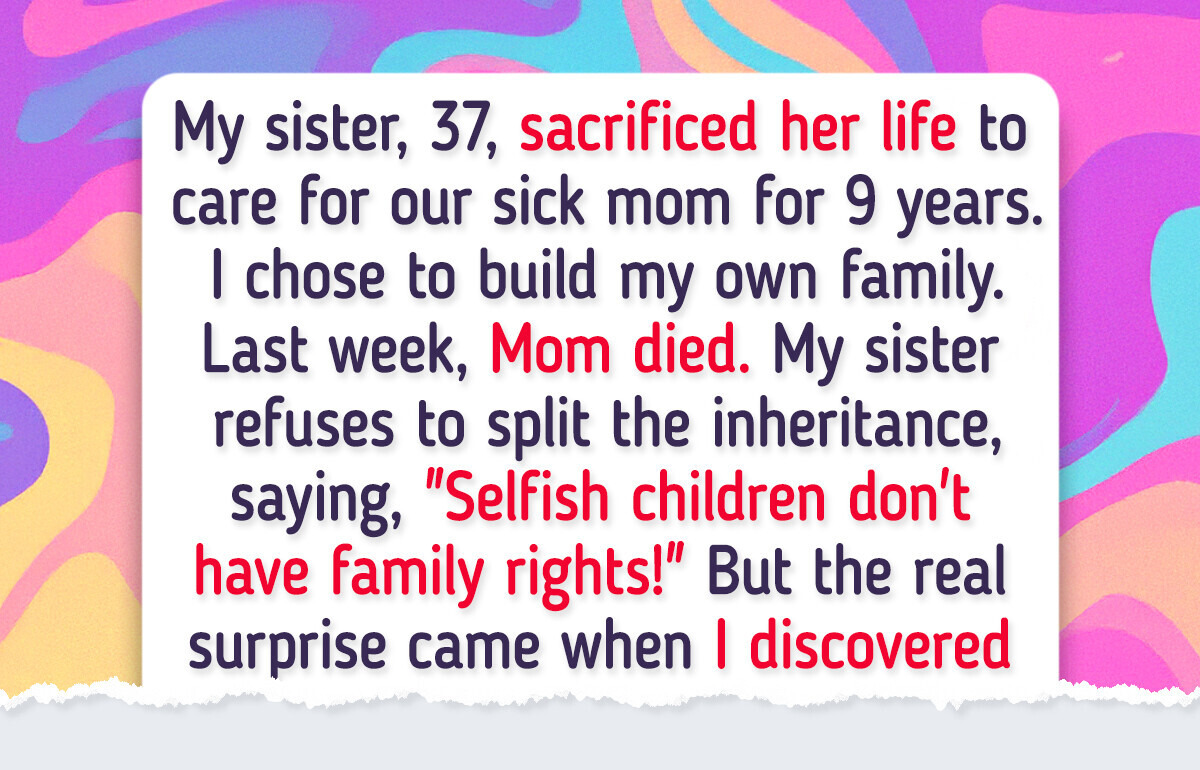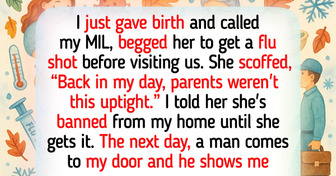You turned your back on your mom to pursue your own life. Your sister gave up everything to care for your mom for NINE YEARS. Even if you can get the estate papers reversed, all she has to do is s submit a bill for her services provided which will come out of the estate before any surplus will be divided. I expect she will end up with it all anyway - think full time caregiver/housekeeper/transportation/cook x 9 years. You have what she missed out on stop being so greedy and entitled.
I Won’t Give Up My Inheritance Just Because I Wasn’t the “Perfect Daughter”

Family disagreements over inheritances frequently spark conflict, particularly when relatives believe they’re owed a greater portion. When Wendy’s mother died, her sister insisted that she hadn’t earned an equal claim to the property, arguing that her commitment to their mother had been lacking. Matters intensified during a visit Wendy made to the house, leaving her emotionally drained and uncertain about what steps to take. In need of support, she turned to us for counsel.
This is Wendy’s letter:
Hi Bright Side!
My name is Wendy. I am a 35-year-old mother of 8-year-old twin boys. Cynthia, my sister, 37, sacrificed her life to care for our sick mom for 9 years. I chose to build my own family. Last week, Mom died. My sister refuses to split the inheritance, saying, "Selfish children don't have family rights!" But the real surprise came when I discovered that, before she died, our mother had signed legal documents leaving everything to my sister.
This includes around $85,000 in savings, a piece of land, and most importantly, our family home.
What’s heartbreaking is that my mother and I never had any issues. She always told me that the house would belong to both of us. But the papers are real—and they bear her signature.
Now I feel lost, betrayed, and devastated. I should not be treated this way just because I wasn't the perfect "devoted" daughter like my sister was.
I don’t know what steps to take or how to move forward.
What should I do?
— Wendy
Hi Wendy,
Thank you so much for opening up and sharing your story. We’ve put together some thoughtful tips that we hope will help guide you through this challenging time.
Confirm whether the paperwork holds legal validity.
Although your sibling gave you a document bearing a signature, it’s wise to speak with an attorney who specializes in probate or estates to confirm whether it’s legally enforceable. Transferring assets or drafting wills usually involves precise legal procedures, like the presence of witnesses or official certification. If your mother lacked mental clarity, faced coercion, or was influenced improperly when signing, the legitimacy of the paper might be disputed in court.
Your sister provided care for almost a decade—if she used that position to sway your mother into altering the property’s title, a legal expert could contest the transaction’s authenticity.
Encourage your sister to consider what’s just and equitable.
Although she may feel entitled to the home and assets because of her role as caregiver, consider opening an honest and heartfelt conversation instead of escalating the conflict—one that focuses on what your mother likely truly wanted for her children.
Gently remind her that you were both brought up by the same loving parent, and regardless of disagreements, your bond as siblings remains. Suggest finding middle ground—perhaps she could offer you a portion of the home's or land's value, or agree to let you keep meaningful keepsakes that hold emotional significance.
Release the situation and distance yourself completely if it becomes essential.
If it seems that fairness is no longer possible and reconciliation feels out of reach, it may be necessary to let go, sever ties, and focus on moving forward.
Maintaining a relationship with someone who intentionally hurt you may only deepen your pain. You might find it helpful to seek counseling or join a support group to work through the emotional fallout and channel your efforts into restoring both your peace of mind and financial footing.
Take this experience as a reminder to structure your future inheritance thoughtfully.
Being caught off guard by your mother’s choices can serve as a powerful lesson in planning your own legacy with clarity for your children. Take steps to define how your belongings will be distributed, have open conversations with your family, and formalize everything through a legal professional to avoid future disputes or exploitation.
If your goal is to shield your kids from the kind of hurt you’ve experienced, consider this a pivotal moment to prioritize honest dialogue and establish firm legal safeguards in your estate plans.
While disagreements can surface among relatives, our families often remain our strongest pillars of support. These 13 real-life stories reveal that family is one of life’s most priceless gifts.
Comments
I went through a similar situation only I was the caregiver. My brother was angry that I hadn't sent him his share. What he failed to understand was that I had to clear out dad's home and I was in the process of moving all while working full-time and getting coins appraised.
Related Reads
I Saved for Years for College—Then My Dad Took It All, His Reason Left Me Speechless

I Refuse to Put My Newborn’s Health in Danger

20+ Moments That Prove Happiness Is Not About the Big Things

I Refused to Do Extra Work Without a Raise — Now HR Will Cut My Salary

I Refused to Help My Homeless Mom After She Spent All My Inheritance on My Sick Sister

13 Stories of Quiet Kindness That Show Superhuman Strength in Ordinary People

I Refused to Knit My Coworker a Free Blanket, and Now HR Is Involved

14 Dates That Started Like Movies but Ended Like Sitcoms

15 Stories That Inspire Us to Stay Kind Even When Life Feels Unfair

16 Times Roommate Situations Took an Unexpected Turn

I Started Leaving at 5 PM Sharp, Now My Boss Questions My Dedication

I Chose My Sick Son Over a Client Meeting—Now I’m Under Review





